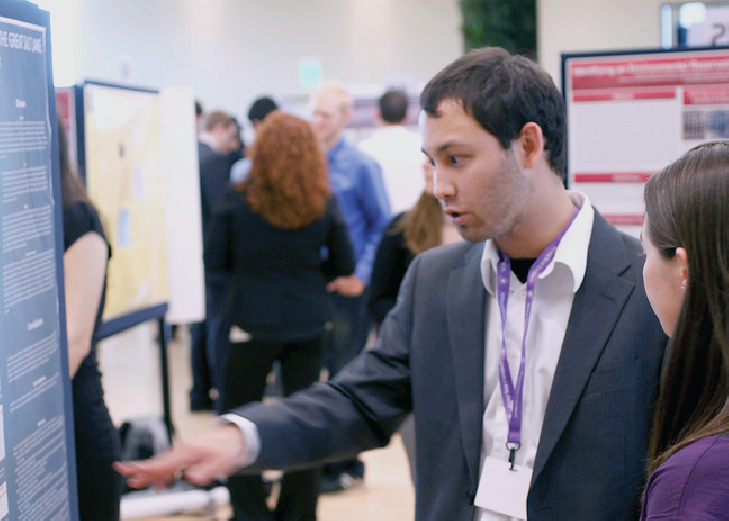
Course-Based Research Experience (CRE) Attribute
What are Course-Based Research Experiences?
Research encompasses a range of academic pursuits, including but not limited to written scholarship, creative works, data collection, fieldwork, literature reviews, and performance-based activities. In course-based research experiences (CRE) each student works with their instructor, individually or as part of a group, to develop and carry out a research project as part of graded course activities. Students then disseminate their project (individually or as a group) through a summative assignment, such as a presentation, paper, or performance. CREs engage students in the process of research in their discipline in a way that is accessible to those who may not otherwise be able to participate in independent or extracurricular research.
What is the CRE Attribute?
The course-based research experience (CRE) attribute denotes courses that include a research experience as a major portion of the course (defined as ≥ 25% of the total overall grade).
CRE course designations can be:
-
Instructor-specific (only sections taught by a particular instructor include a CRE)
-
Course-linked (all sections of a course include a CRE)
-
Added to any existing WSU course that meets the criteria outlined below
-
Added to a new course proposed to the University Curriculum Committee
Why should I apply for the CRE Attribute?
-
Many faculty are already incorporating course-based research, scholarship, and creative works into their courses. The CRE designator makes your efforts official!
-
Connect with a cohort of faculty members across the university implementing CRE for support.
-
A CRE designation indicates that your course is incorporating CRE in a robust, evidence-based manner.
-
A CRE designation advertises your course to students seeking research experiences.
-
Use of the designator helps the university track our success at exposing our students to high impact educational experiences.
Why Course-Based Research Experiences?
CREs Benefit Students
-
Students gain hands-on experience in their field and develop marketable skills for their future.
-
Undergraduate research is a high impact educational experience that promotes student achievement.
-
There is a substantial evidence base for the benefits of CRE to students in terms of cognitive, personal, and professional growth.
- CRE courses increase student retention/persistence in their respective fields.
CREs Benefit Faculty
-
CREs allow faculty to merge their teaching and scholarship.
-
In some cases, students can work on projects that further a faculty member’s scholarship objectives.
-
CREs are a great way to recruit students for independent research, gather preliminary data, and even generate presentations and publications.
-
CREs are formally recognized in some tenure documents.
What are the criteria for CRE designation?
A CRE-designated course must have a student project that meets the CRE Project Criteria, and the CRE Learning Objectives.
CRE Project Criteria
CRE courses must include a course-based research, scholarship, or creative work project(s) that meets the following criteria:
-
Collaboration: Students, or student groups, work collaboratively with a faculty member.
-
Discovery: The outcome of the project is unknown to students.
-
Dissemination: The results of the project are disseminated.
-
Substance: The project represents a major component of the course (defined as ≥ 25% of the total overall grade).
The CRE Curriculum Commitee will use your CRE Project Description, Syllabus, and Assesment Plan as the basis for determining whether your CRE project meets the CRE Project Criteria.
CRE Learning Objectives
The CRE course syllabus must explicitly state the two core CRE learning objectives, as well as one (or more) discipline-specific learning objective for the project.
Core CRE Learning Objectives
All CRE courses must adopt the following major core learning objectives:
-
Knowledge and Skills: Students will acquire the knowledge and skills of a research process.
-
Dissemination: Students will be able to disseminate their project or the results of their research project to an audience wider than their research group or mentor.
Discipline-specific learning objective for the project (instructor-defined)
In addition to the major CRE major learning objectives, courses must have one discipline-specific learning outcome related to course-based projects. These learning objectives are to be defined by the instructor of the course.
Click here for a document containing some examples of discipline-specific objectives.
How do I apply for a CRE Attribute?
Required Materials
Syllabus
Update your syllabus to include the following:
-
A clear description of the course-based undergraduate research project.
-
The plan for disseminating the research project (e.g., presentation, paper, performance).
-
Total grade breakdown that includes the value of the undergraduate research project (must be ≥ 25% for CRE designation).
-
The CRE learning objectives.
You will upload your syllabus as part of the application. The application form also asks for information about dissemination, grade breakdown, and learning outcome verbiage, which you may copy/paste from your syllabus.
CRE Project Description
Write a detailed explanation, not to exceed 200 words, of how course-based research or creative work is incorporated into the course.
Plan for Collaboration
Write an explanation of how students will collaborate with the instructor, including the type(s) of feedback. Please limit your response to 200 words.
Application Process
Application Process
- Complete the GivePulse Application and upload the required materials.
Deadlines
- Classes taught Spring semester: October 1, 2025
- Classes taught Fall semester: March 1, 2026
Approval Process
The CRE Curriculum Committee will review applications each semester using the CRE rubric. Upon approval, the course instructor, department chair, department admin, and dean will be notified. Note: The department chair and dean do not need to approve the CRE Attribute application.
Attribute Term
Once a course is approved for the CRE designation, the attribution will be valid for 5 years, at which point the faculty member will be prompted to apply for renewal if desired. It is the responsibility of the faculty member to contact the CRE Committee to remove the attribute designation if the course will no longer be a CRE course.
Resources for Creating CRE Courses
-
Want to get started designing a new CRE course? Check out (and contribute to) the Canvas collection of resources here.
-
CUREnet: CURE examples and information for the sciences from the Sceince Education Resource Center at Carleton College (SERC)
-
Check out our curated list of references from the literature.
Questions?
If you have any questions, please contact the CRE Curriculum Committee Chair, Tracy Covey: tracycovey@weber.edu
Need funding support for your CRE Course?
Faculty can apply for CRE Grant Funding to apply for money to be used in their Course-based Research Experience (CRE) approved courses.




